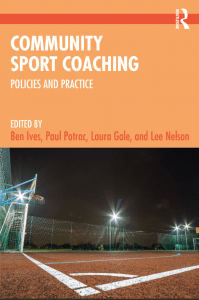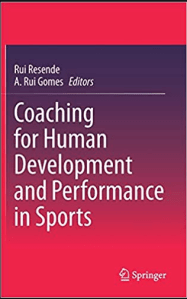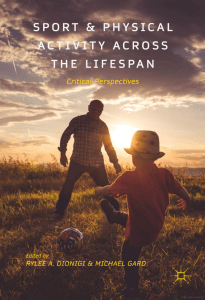Book chapters and book references for those who want to explore reading material
Book Chapter: Coaching Older Adults (Aged 55+)
Dionigi, R. A., Eime, R., Young, B. W., Callary, B., & Rathwell, S. (2021). Coaching older adults (aged 55+). In Community Sport Coaching (pp. 147-166). Routledge.
Despite the benefits community sport can bring to older adults (aged 55+), such as social support, mental, and physical health and fun, national sporting policies tend to focus on young age groups in terms of participation and elite performance, so community sports are often required to align their strategic focus with these policies. Therefore, there are scant (yet emerging) sporting policies, formal sport coaching, and coach education opportunities specific to older adults in countries such as Australia, New Zealand, England, and Canada. This reality poses problems for coaching older adults in community sports. However, there is recent research, particularly in Canada, that reveals the everyday realities of coaching older adults, such as the importance of meeting athlete needs for competition, health and/or fun, developing personal relationships, accounting for age-related changes, and applying adult learning principles to the coaching context. In this chapter, we discuss these factors and offer some strategies to assist those embarking on community sport coaching work with older adults. Purchase here –>
Book Chapter: Coaching Aging Athletes.
Callary, B., Young, B., Cassidy, T., & Culver, D. (2020). Coaching Aging Athletes. In Resende, R., & Gomes, R. (Eds.) Coaching for Human Development and Performance in Sport. Springer.
While all athletes are aging, in this chapter we refer to Masters Athletes (MAs) as adults typically over 35 years of age, who are formally registered for sport, and who engage in training to prepare for competitions. While this cohorts of athletes is the one of the fastest growing cohorts in sport, research is only beginning to uncover the nuances involved in successfully and effectively coaching them. In this chapter, we first discuss the empirical findings related to coaching MAs from the first and second authors’ research endeavours. We then explore challenges for coach development. The practical implications of this research are divulged through the fourth author’s personal story of being a MA. Finally, the third author will share her story of being a long-time coach of MAs, including some of the challenges and considerations for coaches who wish to successfully enable these athletes to achieve their respective objectives in sport. We relate the findings to key points that promote coaching in the Masters community, whether professionally or on more of a volunteer basis. Purchase here –>
Book Chapter: What’s Good for the Goose is Good for the Gander: Using Adult Learning Principles to Synergize Coach Education and Coaching Practices in Masters Sport.
Callary, B., & Young, B. (2019). What’s good for the goose is good for the gander: Using adult learning principles to synergize coach education and coaching practices in masters sport. In Callary, B. & Gearity, B. (Eds.) The coach developer’s instructional guide: Exemplary practices in coach education. London: Routledge.
In this chapter, we engage the reader in acquiring new understandings of how to selectively use adult learning principles. More specifically, we elaborate upon a critical idea: The learning principles we advocate for coaches to employ in learning situations among their adult athletes are the same principles that coach developers can use to enrich the coach education process. Adult athletes are commonly known as Masters athletes (MAs), a broad cohort of adults who are typically aged 35 and older, registered for organized sport, and who prepare in order to participate in sport, often with a coach. In a line of research exploring the nuance of coaching MAs, we have found that coaches who frequently apply adult learning principles are highly effective in meeting the needs and interests of this cohort (for more information see Callary, Rathwell & Young 2015, 2017, 2018a. Outside of sport, these same principles for adult learning have proven when applied by learning facilitators to students in adult education (Knowles, Holton & Swason 2012). Purchase here –>
Book Chapter: Psychological Considerations for the Older Athlete.
Young, B.W., Callary, B., & Rathwell, S. (2018). Psychological considerations for the older athlete. In O. Braddick, F. Cheung, M. Hogg, J. Peiro, S. Scott, A. Steptoe, C. von Hofsten, & T. Wykes, Oxford Research Encyclopedia of Psychology. New York: Oxford University Press. Online publication. DOI: 10.1093/acrefore/9780190236557.013.180.
Paralleling the graying of the baby boomer generation, there has been remarkable growth in the number of Masters athletes (adult sport participants generally 35+ years old) and Seniors athletes (55+) worldwide. The phenomenon of the aging or older athlete is an opportunity to study the psychological conditions and considerations that distinguish older sportspersons from their younger counterparts. Although the vast majority of sport psychology research focuses on youth and adolescents or young adults in a high-performance context, a critical mass of literature on middle-aged and older athletes has emerged. Much research has aimed to understand the sport motivation of older adults; this work has evolved from early descriptive works to increasingly theoretically grounded and analytically advanced efforts that seek to better understand older athletes’ sport commitment and their long-term goal striving behaviors. Another theme of inquiry relates to the nature of adult athletes’ social motivations and the role of social identity in explaining immersion into sport. Research has examined various social influences on older athletes, and specifically how different social agents and social norms come to bear on older athletes’ sport participation. Much work has interrogated how social support facilitates older sport participation as well as the unique negotiations that older adults make with significant others to sustain their experience. Another research theme has sought to determine the various psychosocial benefits of adult sport, cataloguing benefits related to personal growth, age-related adaptation, and successful aging outcomes. Although the discourse on adult sport has been overly positive, several contributions have problematized aspects of adult sport, challenged the assertion that adult athletes are models that many others could follow, and have further suggested that narratives of Masters athletes may reinforce ageist stigma.
Read more –>
Book Chapter: Doing “More for Adult Sport”: Promotional and Programmatic Efforts to Offset Adults’ Psychosocial Obstacles.
Young, B.W., & Callary, B. (2017). Doing “more for adult sport”: Promotional and programmatic efforts to offset adults’ psychosocial obstacles. In R. Dionigi & M. Gard (Eds.), Sport and physical activity across the lifespan: Critical perspectives. UK: Palgrave Macmillan.
This chapter addresses psycho-social and pedagogical research pertaining to adult sportspersons, or Masters athletes. Young and Callary specifically review three areas that may inform strategies on how to attract more interested adults to sport: promotional messaging, accommodating participatory motives in programming and tailoring curriculum to the needs of adult athletes. Working from the premise that more effective informational strategies are needed to promote adult sport, the authors present emerging research to illustrate how messaging around involvement opportunities may persuade middle-aged adults who participated in sport in youth to re-engage as adults. The authors then discuss a line of inquiry examining whether adult sportspersons see participatory motives accommodated in their programming differently than adult exercisers, and whether incorporating motives into sport programming may be a strategy to grow adult sport. The authors appraise emerging findings and what they mean for the recruitment or retention of adult sport participants. They further identify areas demanding greater scrutiny, including conceptual limitations and the risk of overgeneralizing results beyond privileged and exclusive adult cohorts who may already have an interest in sport. Finally, the authors describe research portraying how learning principles are different in adult sport than in the youth context, specifically underscoring the pertinence of andragogical principles. Based on perspectives from athletes and coaches, this work suggests that to do ‘more for adult sport’, current coaching curriculum and programming may need to be reconsidered to facilitate enriched sport experiences for an older cohort of adults. Purchase here –>




